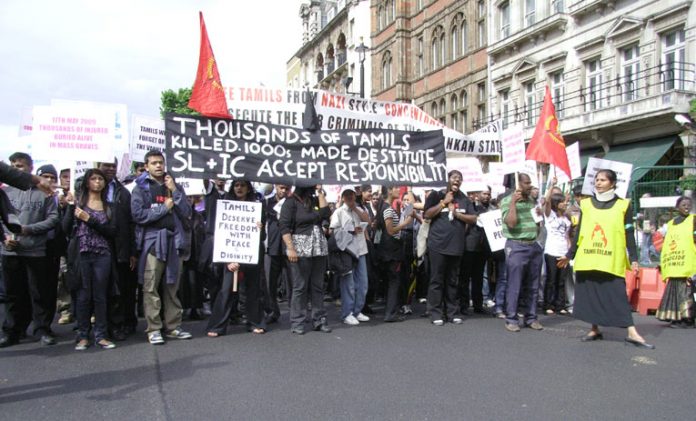THE Sri Lanka Army (SLA) in Vanni has refused permission to the uprooted families of Kumaarasaamipuram and Mayilvaakanapuram in Ki’linochchi district to resettle in their lands claiming that the area is infested with landmines, Tamilnet reports.
These people were brought from Vavuniyaa SLA Menik Farm camp by Sri Lanka government authorities promising resettlement in their own villages.
But now they are left abandoned in deserted places without sufficient food, water, hygienic facilities and safety, the affected civilians said.
Some 241 families in Piraama’nankaadu school building and 60 at 12th Mile Post in Visuvamadu are left to fend for themselves, let down by Sri Lanka government authorities and humanitarian organisations.
Kalmadu tank, the water source in the area being destroyed during war, the families have to walk a long distance to fetch water for drinking and other purposes from other water tanks.
The SLA has divided the districts of Ki’linochchi and Mullaitheevu into two SLA Zones and many uprooted families brought from Vavuniyaa camps with promises of resettlement in their properties are left abandoned in many areas in Mullaitheevu SLA Zone being refused permission by SLA.
The Sri Lanka Army in Vanni has declared the villages of Mayilvaakanapuram and Kumarasaamipuram in Ki’linochchi district not allowed for resettlement as they had been reserved for SLA use.
140 uprooted families of the two villages brought to be resettled two months back after detention in Vavuniyaa SLA camp by Sri Lankan civil authorities have not been allowed to resettle in their properties.
The uprooted families are forced to live in temporary sheds erected in a bare land without any basic facilities.
They had been detained in Menik farm SLA camp in Vavuniyaa for more than an year.
Having lost all their belongings during the war on Vanni by Sri Lanka government, the families suffer abandoned by Sri Lankan civil authorities.
At least a thousand of the persons disappeared during Sri Lanka government’s war on Vanni are students below the age of eighteen.
Their families, mostly mothers, have begun a desperate search for their children gone missing after arrest by Sri Lanka Army (SLA) at the end of the war, Education Department officials said.
Sri Lanka government has failed to disclose the particulars of the teenage students who had either surrendered or been arrested while humanitarian organisations responsible for tracing persons disappeared have no information on them.
With most of the resettled families in Vanni, having lost their family heads and male members, the mothers have begun to put up notices with details of their children gone missing, outside the schools where they had been studying.
The mother of Tharmalingam Kaviraj, 16, a tenth grade student of Ki’linochchi Tharmapuram Makaa Viththiyaalyam, who had lost her husband during the war had put up a notice seeking her son.
She said that she is unable to get any information about him from any of the related authorities.
Similar notices have appeared in many schools in Vanni which have begun to function after resettlement.
The social activists and organisations, vociferous on the rights of children and child soldiers during the war, are now conspicuously inactive doing nothing to help trace the teenage students disappeared during the final days of Sri Lanka government’s war on Vanni, teachers in Vanni said.
Sri Lanka Army (SLA) has reinstalled its checkpoint in Yaanaiyi’ravu (Elephant Pass) at the gateway to Jaffna peninsula where all vehicles passing through A9 land route are instructed to register their entry and exit.
A similar SLA checkpoint at Oamanthai is already in existence.
Persons entering Vanni who are not in possession of Sri Lanka National Identity Card of Passport are sent back to obtain Sri Lanka Ministry of Defence (MoD) permission to enter Vanni through Oamanthai SLA checkpoint.
The owners of vehicles going in and out of Jaffna peninsula said that the new SLA restriction causes unnecessary delay and inconvenience as they have to register their vehicles at Oamanthai and Yaanaiyi’ravu checkpoints.
Yaanaiyi’ravu had evolved into a strategic SLA bastion during Sri Lanka’s war on Vanni.
Meanwhile, Sri Lanka police have received 101 complaints of abductions since January to the end of July in various parts of Sri Lanka and 93 of them are related to ransom demands, SL police spokesman Preshantha Jayakody told media in Colombo.
The highest number of complaints was in Colombo Central and South and 60 abducted persons related to 63 complaints had been traced so far, he said.
The recommencement of registration of Tamils with the police and targeted search operations have created a renewed sense of insecurity and injustice amongst the larger Tamil population that is detrimental to national reconciliation, said Democratic People’s Front Leader Mano Ganesan.
Ganesan has called on Sri Lanka President Mahinda Rajapakse to intervene to halt the police registration of Tamils in the Wellawatte Police division in Colombo saying that the searches are discriminatory and against the spirit of reconciliation.
Earlier, the National Peace Council (NPC) of Sri Lanka in a statement issued on Saturday noted that ‘the practice of registering Tamils and security search operations of private residences even late at night were carried out during the period of war and terrorism.
‘Today more than 14 months have elapsed since the war ended, and there have been no acts of militancy or terrorism in this period that would necessitate a revival of the harsh measures of the past.
‘Two months ago Sri Lanka’s Parliament approved the repeal of a large number of emergency laws which was projected worldwide as a sign that normality had returned to Sri Lanka,’ the NPC statement noted.
Responding to a query from the media last week the Police spokesman said that action was taken under the Police Ordinance in this respect.
The NPC statement said, ‘The Police Ordinance gives power in respect of detection and prevention of crime. It cannot be applied in an ethnically discriminatory fashion.’
